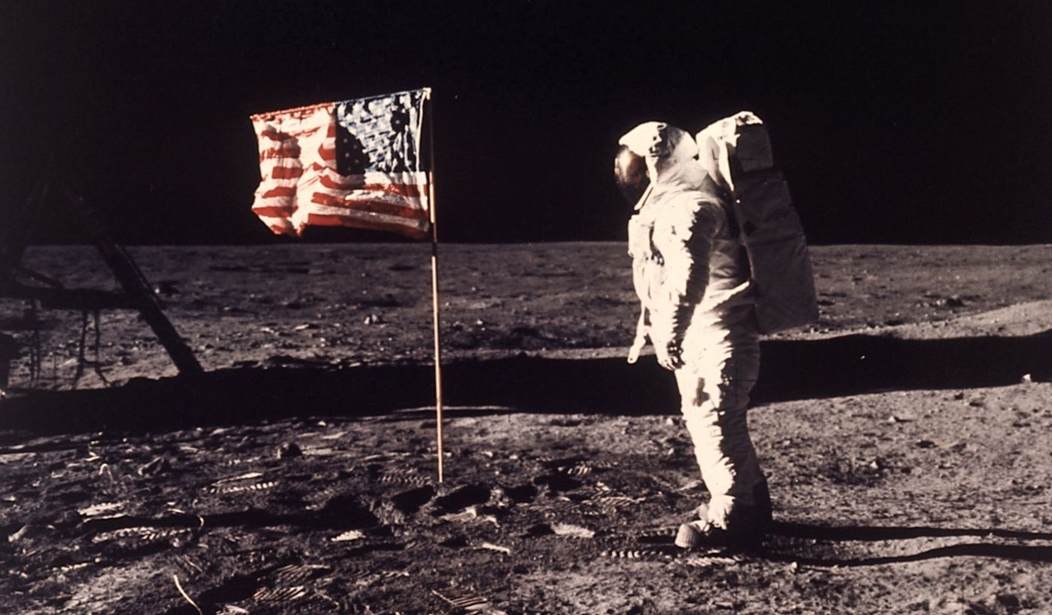Fifty-three years ago this week, America launched Apollo 11, a mission that reached a pinnacle of scientific and national achievement with the successful landing of the Lunar Module Eagle on the Moon. The Apollo 11 Moon landing represented not only a crowning triumph for humanity, but it was one of America’s most noble and awesome moments. It was an accomplishment so monumental that to try and describe it in words almost undersells its importance. It truly was – and still remains – one of the most awe-inspiring milestones in human history.
Think about all of this for a moment. Over a half-century ago – without a sliver of the computing power we have now and with only a fraction of the advanced modeling and simulation technology at hand today – we put human beings on the lunar surface. It was a technological feat of unprecedented proportions. There were no supercomputers, how-to videos on YouTube, or ready answers on Google. We did it with hypotheses and testing, analog technology, manual chronographs, slide rules, and chalkboard math.
And there was no playbook to study – it was true technology trailblazing, in lockstep with America’s traditional frontier spirit. In fact, given that America’s formal space program existed in earnest for less than two decades prior to the landing, putting humans on the Moon was a ground-breaking endeavor almost every step of the way. But we navigated uncertainty and the unknown with the right combination of vision, daring, and calculated risk while maintaining a laser focus on the goals. When a challenge or hurdle complicated our effort, we didn’t simply complain and quit – we got creative. We innovated, adapted and figured it out. We learned from our mistakes and went back to the drawing board (literally) to make adjustments and improve our approach. Incidentally, it was this attitude that not only put Americans on the Moon in July of 1969, but also brought the Apollo 13 astronauts back to Earth in 1970.
Recommended
Beyond the glory of the Moon landing itself, the entire Apollo program – and Mercury and Gemini programs before it – stands as a sterling testament to what strong leadership and unity of purpose can achieve. The Apollo program consisted of hundreds of thousands of people, each responsible for different but vital aspects of the mission, working together across different sites for weeks, months and years. It required unwavering coordination and alignment between the public and private sectors, and involved everyone from appropriators in the Congress to engineers and technicians in the lab. It was a herculean undertaking – but commitment, organization, and active and effective management made it all possible.
Finally, we maintained adherence to the task and never lost sight of what was important despite the upheaval and turbulence of the times. We often forget that the Apollo program endured through the 1960’s – a period not completely unlike our contemporary era – which was marked with the assassinations of several national leaders (including a sitting President), a grossly unpopular war, radically changing cultural values, riots, social tension, and violence. But we stuck with it through the highs and lows, kept our eyes on the road, and drove on toward the objective.
Incidentally, this year also will mark the 50th anniversary of Apollo 17 – which was the last Apollo journey to the Moon (completed in December of 1972). Like many of the other missions, it set new records in science, technological and human achievement and was a successful last chapter in the Apollo program. In looking back, whether it was the first or last steps that Americans placed in the lunar dust, all of those missions essentially represented a magnificent capstone achievement in what was a serious, decade long effort concentrated on one goal – outlined by our national leaders and executed by the people. As we look toward our next expeditions in space, namely a return to the Moon and beyond, we would be wise to take some of these core lessons from the Apollo program. Frankly, there are a lot of things we could learn from Apollo to improve and enhance America’s standing and position aside from space.
The Apollo program is but one example of American greatness that manifests itself when we’re serious, when we ignore petty distractions and challenge the impossible with hard work and spirit.
It is something we’ve actually done quite often as a country – think of the Berlin Airlift, the building of the transcontinental railroad, or American war production in WWII – and we do it well when we try. The Apollo 11 anniversary is a reminder of what America can do when it puts its mind to a noble task. It is a reminder of what can be done when we apply national, political and cultural energy on something that actually matters…something of weight, purpose and lasting importance…something that is greater than the sum of all of its parts…something that was, and is, “For all Mankind.”
Grant Anderson, P.E. is the President & CEO of Paragon Space Development Corporation, a recognized leader in life support and thermal control in extreme environments. He holds a B.S. in Mechanical Engineering and an M.S. in Aeronautical & Astronautical Engineering from Stanford University.

























Join the conversation as a VIP Member